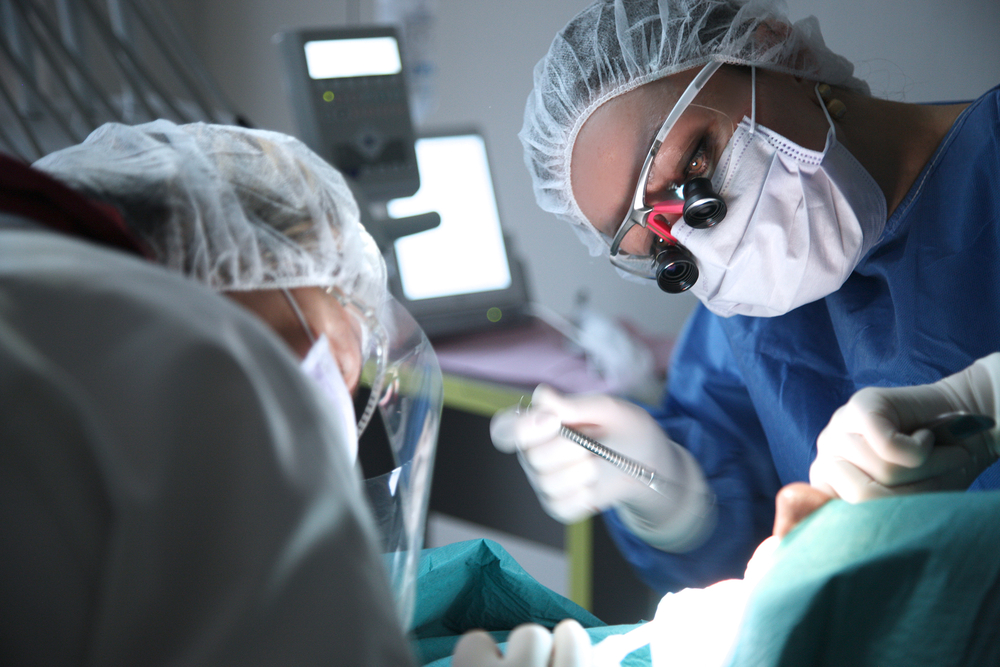Most of the time when you go to the dentist, you see a general dentist. They will examine your teeth, take X-rays, carry out teeth cleaning, and fit dental fillings. But if you have a more complicated issue, you will need to see a specialist and there are different specialists for different oral health conditions.
If you have been told by your dentist that you need special dental treatment such as oral surgery, you are likely to have many questions, including who will carry out the treatment and what is a dental surgeon called.
Continue reading this article to find out what a dental surgeon is called together with other key information on oral surgery. You will also find details of other dental specialists.
What is Oral Surgery?
The term oral surgery is used to describe surgical procedures on your teeth, jaws, gums, and other oral structures. If you need oral surgery, the operation is performed by a periodontist or oral and maxillofacial surgeon. They have completed advanced studies in oral surgery.
Oral Surgeons and Oral Pathologists
Oral surgeons and pathologists are trained to treat oral diseases in the teeth, gums and jaw. Conditions they will address include misaligned jaws, oral reconstruction, impacted wisdom teeth, oral cancers, and cancers of the head and neck.
Other operations that fall under their field of specialization include dental bone grafts, teeth extractions, corrective jaw surgery, and gum grafts. You may also need oral surgery if you have missing teeth, extensive tooth decay, gum disease, badly broken teeth, impacted teeth, bone loss in your jaw, cysts, or benign tumors.
Often, oral surgeons will work closely with ENTs who are ear, nose, and throat specialists. Together with ENTs, they will treat issues such as facial trauma and sleep apnea.
Types of Oral Surgery

Oral surgeóns are qualified to perform a range of operations, which range from treatment of diseases to corrective surgeries.
Tooth Extraction
Tooth extraction is the most common operation performed by oral surgeons. You may need to have your tooth extracted if you have severe tooth decay or gum disease. It may also be required if you have impacted teeth or dental trauma.
Bone Grafts
Dental bone grafts are carried out if you have bone loss in your jaw. Bone loss can occur if you have had a tooth missing for a long time because there are no roots stimulating the nerves. Advanced gum disease can also cause bone loss.
Implants
Dental implants are long-lasting replacement options for missing or broken teeth. An oral surgeon embeds the implants into the jaw where they will replace the missing roots. A dental crown, bridge, or denture can be fitted on top of implants.
Gum Surgery
Periodontal surgery is used to treat periodontitis, which is gum disease. During the operation, the surgeon will clean bacteria and plaque from the roots of your teeth by making incisions along the gum line. After the cleaning, the gum tissue is sutured back into place.
Corrective Surgery
Corrective jaw surgery may be required in cases of skeletal abnormalities in the jaw bones. These operations are performed to address facial imbalances, correct misalignment, or improve chewing function. It can also ease pain caused by TMD, which are temporomandibular disorders.
Sleep Apnea Surgery
Oral surgeons are also qualified to treat obstructive sleep apnea (OSA). This condition occurs when during sleep, tissues in your throat block your airway. Sometimes OSA can be treated by, for example, using a CPAP machine or oral appliance therapy. Other times, surgery may be required to address the issue.
Cleft Lip or Palate Repair
Sometimes babies are born with a cleft lip, which is an opening in the upper lip, or a cleft palate, which is an opening in the roof of the mouth. Some babies are born with both conditions. Maxillofacial and oral surgeons will perform surgery to restore normal functions, including eating and speech development.
How Long Will Oral Surgery Take?
Each surgery is different so the length of the surgeries varies. The length of the procedure depends on a range of factors such as how many teeth are treated, whether you are sedated for the surgery, and the type of surgery you are having. A single tooth can be extracted in thirty minutes, while corrective jaw surgery can take up to three hours.
What Will Happen During Oral Surgery?
This also depends on the type of treatment you are having. Sometimes you will have the treatment at your dental office, other times you may need to go to a hospital. For some operations, your dentist will offer you sedation options, while others will require general anesthesia.
What Treatments Do Other Dental Practitioners Provide?

Now that you know more about dental surgery and dental surgeons, let’s look at what other dental practitioners do. While all practitioners will have a dental degree, some, like oral surgeons, will have specialized in different areas of dentistry following their general dental school studies.
General Dentists
Your primary oral health care is provided by general dentists. They will perform routine dental examinations, teeth cleaning, and evaluations. General dentists are also qualified to carry out treatments such as cavity removals, dental fillings, root canals, tooth extraction, and fitting dental crowns.
If your general dentist identifies an oral health issue they cannot treat, they will refer you to a specialist. Which dentistry specialist they refer you to will depend on the condition you need treatment for.
Endodontists
Endodontics is carried out by root canal specialists. They have specialized in problems that affect the nerves of our teeth. They can also address the pain associated with root canal issues. If tooth decay has reached a tooth’s nerve, an endodontist is qualified to perform necessary root canal treatments.
Orthodontists
An orthodontist is a dental practitioner who specializes in jaw alignment and teeth. They will use braces, wires, retainers, and other devices to guide your teeth and jaw into the right alignment. If your teeth are misaligned or you have crossbite, underbite, or overbite, your regular dentist may refer you to an orthodontics specialist.
Pediatric Dentists
Pediatric dentists, also called pedodontists, are dental practitioners who have specialized in treatments and dental care for children and young people. The pediatric dental practitioner will use a youth-friendly approach to dental care and have knowledge of pediatric-specific dentistry and dental issues.
Pedodontists monitor oral development and teeth growth from infants to teenagers. If a dentist who specializes in caring for children and young people’s teeth identifies issues in how a young person’s teeth are developing, they will refer the patient to an orthodontist to correct issues at an early stage.
Periodontists
Periodontists are gum specialists who treat and repair problems and diseases of the gums. While your regular dentist will support you with preventing gum disease, a periodontist will treat soft tissue that has been damaged by progressive gum disease. They can also perform minor surgery on the gums and fit dental implants.
Prosthodontists
It is the job of prosthodontists to repair jaw bones and teeth. Prosthodontics improve your teeth’s appearance, including veneers and teeth whitening, all of which come under the umbrella of cosmetic dentistry. Prosthodontists can also fit dentures, bridges, and crowns for patients.

Which Type of Dentistry Do You Need?
Referrals to dental specialists are done through your dentist. When you visit your regular dentist, they will assess your teeth, gums, and overall oral health and perform any dental work they are qualified to deliver. When the issue is outside their field of practice, they will refer you to a specialist.
Often oral health issues are identified during routine visits to the dentist. This is why everyone should see a dentist at least once a year, preferably twice, so issues get detected early. If you experience pain in your teeth, gums, jaw, or any part of your mouth, do not wait until your regular appointment but see your dentist without delay.
Are Specialist Dental Treatments Covered by Dental Insurance?
Dental insurance generally covers dentistry that is necessary for your health and well-being. Most insurances will not cover cosmetic dentistry such as teeth whitening or veneers. Also, many insurances will have a deductible, meaning they will only cover part of the cost.
If you have dental insurance, check the terms with your insurance provider. That way you will know how much you will be required to pay yourself and can make plans to cover the costs before your specialist treatment.
Conclusion
If you need dental surgery, the operation will be performed by an oral surgeon or a maxillofacial surgeon. Some oral surgery can take place at your regular dentist’s office, while others will be carried out at a hospital.
When you require specialist treatment, you are referred to the correct specialist by your regular dentist. They may diagnose an issue that needs special attention during a regular checkup visit. Alternatively, see your dentist if you experience pain in your mouth at any time.

